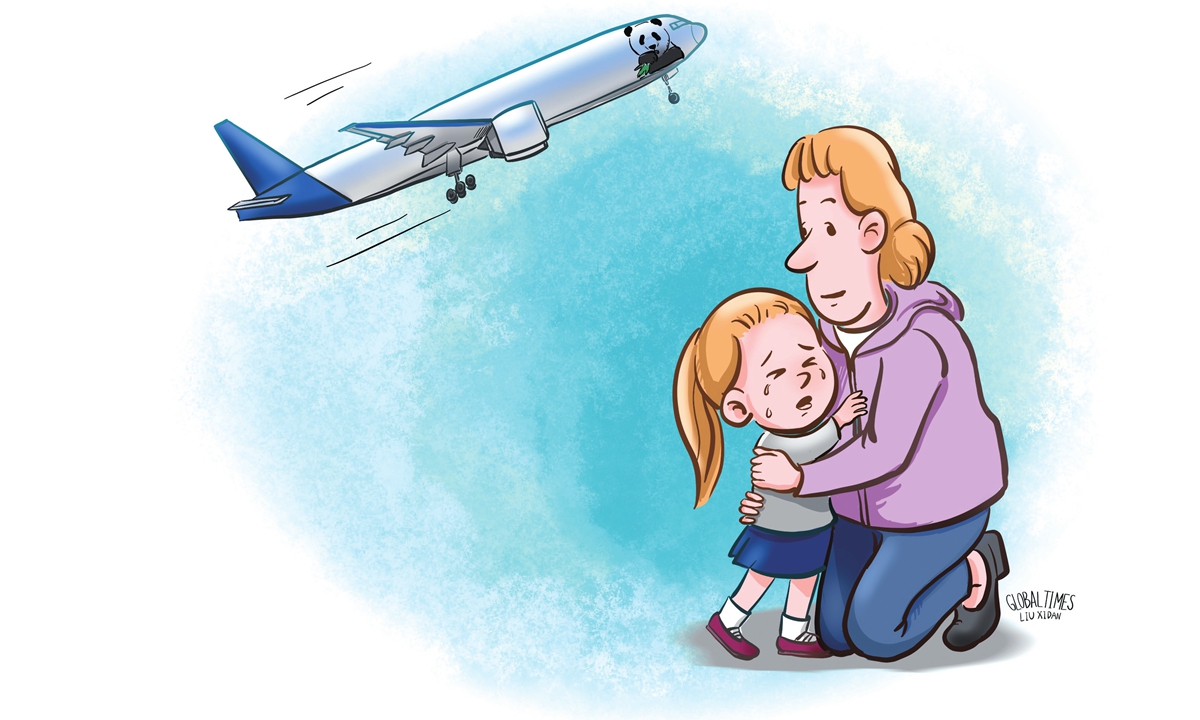
Illustration: Liu Xidan/GT
An open letter to whomever in the US can bring pandas back to the country:I want you to imagine that for more than half a century, children throughout China could go to any zoo in that country and see the bald eagle, the national symbol of America. Those children, enthralled by the size and power of the bird, were also mesmerized by how graceful it looks in flight as its wings spread wide and proud.
Now imagine one day the eagles were gone. No Chinese child would again watch that majestic bird, and maybe, just maybe, develop an affinity for the US.
Crazy, you say? No animal could have such an appeal to children. Then I ask you to remember the old saying that "a picture is worth a thousand words." And I challenge you to look closely at a photo in the November 9 edition of the Washington Post: A six-year-old girl from Missouri was in tears, with her mother consoling her.
The headline to the story explained why the young girl was crying: "A day after pandas leave, heartbroken zoogoers mourn D.C.'s loss."
Readers soon learned that "Mei Xiang, 25, Tian Tian, 26, and their 3-year-old son, Xiao Qi Ji, had just left the zoo for China, making D.C. panda-less for the first time in 23 years. The giant pandas were escorted out of the zoo in three large shipping crates, alongside about 220 pounds of bamboo for snacking en route. Zoo officials never divulged a specific date ahead of their departure, catching many panda fans off guard."
How could the many diplomatic, cultural and other organizations engaged in fostering goodwill between countries let this happen? And why cloak the pandas' departure in such secrecy? This left at least one child in tears. One of the pandas' keepers added: "It's a little bit heartbreaking to not have them here."
The giant panda - a huge and seemingly cuddly black and white mass of fur - is to China what the bald eagle is to the US. Granted, no panda carries diplomatic papers; it does not speak to foreign leaders and private citizens. However, neither you nor I should ever forget that the panda is an ambassador. It brings smiles to people's faces and opens minds. Children learn about the panda and its country of origin. And no one has ever seen bamboo without thinking of pandas.
American children have fallen in love with pandas inside US zoos for more than 50 years. According to the National Zoo, in 1972, first lady Patricia Nixon, accompanying her husband as part of Richard Nixon's historic visit to China, informed premier Zhou Enlai that she was fascinated by the giant beasts. "As a gesture of goodwill following President Nixon's seminal state visit, Premier Enlai gifted two giant pandas to the American people," according to the zoo's website.
Over the next 51 years, zoos from California on the west coast to Georgia on the east coast, housed pandas. Now the only pandas on US soil are at the zoo in Atlanta, but they will be shipped home next year.
I follow US-China relations closely, so I know what one of you is likely to say: The unsettled relationship between the two countries explains why the US will soon have no pandas. That answer does not work when you consider that the two nations had trade in goods and services that totaled more than $750 billion last year. That answer also looks inadequate when you realize that roughly 290,000 Chinese students are studying at American colleges and universities. Finally, that answer makes zero sense when you recognize that cultural exchanges between the two nations are again on the rise following the pandemic. As just one example, the Philadelphia Orchestra has toured in Beijing for the first time since 1973.
So, no, the political differences between the two countries do not offer a legitimate reason for the soon-to-be absence of "panda-monium" in the US.
When will the National Zoo again house a panda? When will families visiting Washington be able to visit the zoo and see a panda, as almost 21 million Americans did in 2022? The Washington Post's reporting did not offer much encouragement: "It is not clear when, or if, the zoo will get giant pandas again. The zoo in San Diego sent its giant pandas to China in 2019; they have not been replaced."
Do the right thing. Engage with your Chinese contacts immediately. Bring more pandas to America. Turn those tears on the six-year-old Missouri girl from sadness to joy.
Thank you.
The author is an associate professor at the Department of Communication and Organizational Leadership at Robert Morris University. opinion@globaltimes.com.cn


